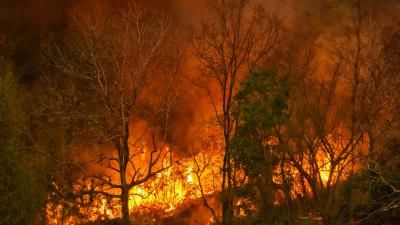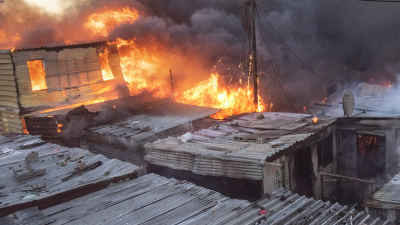
Building resilience from devastating wildfires
A collection of works exploring a safer world, this series of images from the frontline of one of South Africa's largest fires captures the destruction caused to informal settlements.
This page is approximately a 5 minute read
This page was published on

Shipping is a key user of the oceans, delivering essential goods and commodities, taking ferry passengers to their destinations and carrying millions of tourists on cruises.
Devasting fires occur frequently in many of South Africa’s nearly 3,000 informal settlements and in backyard dwellings, leaving thousands of people homeless and resulting in numerous fatalities, explains Professor Richard Walls, head of the Fire Engineering Research Unit at Stellenbosch University (SU).
In 2022, 190 people died in informal settlement fires in Cape Town alone, while hundreds more were displaced. Similar figures are evident throughout the country, as densification increases the risk of fire spreading through informal settlements and in backyards where structures are erected using flammable materials. The impact of these fires is far-reaching, but the solutions offered by authorities in preventing them from recurring are minimal.
“After large fires, many entrepreneurs emerge with quick-fix solutions marketed to politicians to help protect communities. However, what scientific basis is there for evaluating fire safety solutions for informal settlements, and what can be done to protect them?” asks Walls.
In response, Lloyd's Register Foundation has annouced a new grant to Stellenboche University and the Western Cape Government, who have joined forces to develop a world-first Fire Engineering Guideline for Informal Settlements. The work, which has recently been released and includes associated brochures, posters, and training videos, is based on years of extensive testing and research on informal settlement fire safety by SU and associated partners.
An international NGO for promoting fire safety in low-income countries, Kindling, assisted the work along with the Research Alliance for Disaster and Risk Reduction (RADAR) based at SU. Furthermore, the City of Cape Town’s Fire and Rescue Services was involved through the Milnerton Fire Department. The Western Cape Department of Infrastructure (previously Human Settlements) co-funded the work.
The suite of training material, which is freely available, consists of a book of almost 140 pages offering detailed guidance on topics ranging from fire safety strategies to considerations when using smoke detectors. A series of training videos, produced by well-known videographer Justin Sullivan, makes the technical content more accessible to the public.
"NGOs can use the brochures, available in multiple languages, to identify potential solutions and strategies for reducing the impact of fire disasters. Importantly, this guideline is not a fire safety textbook. It is based on experiments, analyses, and consultations with affected communities, and it is written for practitioners, NGOs and civic groups.
The work highlights the importance of understanding that this complex problem can only be improved by a multi-sectoral response. This needs to address issues such as reducing the risk of ignition, providing early warning systems, having community involvement, having well-resourced and well-prepared fire departments, reducing the combustible nature of homes, and other similar factors." says Walls. “There are no quick fixes. While both informal settlements and informal settlements fires are here to stay, the research and guidelines produced can help ensure that our interventions have the greatest impact for the lowest cost. Also, we can now more quickly identify ‘solutions’ that actually don’t work.”
Work on the guideline was sponsored by the Western Cape Department of Infrastructure, along with co-funding from Lloyd’s Register Foundation.
The consequences of fires in informal settlements are devastating – but also preventable. Until there are enough skilled engineers that can make informal settlements more resilient to fires and protect vulnerable communities, resources like those produced by our partners SU and the Western Cape government, are vital in helping build local capacity and keeping people safe from harm.
Dr Robyn Pharoah, a social scientist from Research Alliance for Disaster and Risk Reduction (RADAR) at SU, explains "fire safety interventions need to be socially suitable. When an inappropriate gadget is imposed on a community, without their involvement, it is unlikely to have the desired impact.”
Speaking on the impact of frequent fires, Western Cape Provincial Minister of Infrastructure Tertuis Simmers says: “Fire safety in informal settlements is a massive concern to the entire Western Cape Government as on an annual average there are 1 260 fire occurrences registered. Safety is a priority and therefore, advocacy and consumer education on fire safety are programmes that we fully support. Our region is prone to devastating fire outages during the summer season in both informal settlements and wildfires. The launch of these materials could therefore not have come at a better time.”
Mark Smith, a firefighter from Milnerton who has responded to many informal settlement fires in Dunoon and who is also co-author of the Fire Engineering Guideline, explains with the importance of addressing the problem with the affected communities.
These fires are extremely difficult to put out. Tightly packed homes result in fires that spread very fast. Also, narrow streets and alleys, people evacuating, low-hanging fires and lack of water make our job very difficult. However, when the local community assists us, it can have a big impact.
Danielle Antonellis, the founder of Kindling, comments that having guidelines based on research, and not just quick-fix solutions, will empower people to ensure their own safety and speedy response to emergencies. “It’s about people’s right to be safe and feel safe in their homes, irrespective of whether they live in an informal settlement or elsewhere. Sociotechnical approaches are direly needed that centre communities and bring institutional resources and support to bear. Solutions are not just about reducing risk; they should help communities find ways to keep themselves safe.” Kindling is a US-based nonprofit organisation founded in 2020 to support and inspire fire safety in vulnerable communities around the world.
Image credits: Brenton Geach